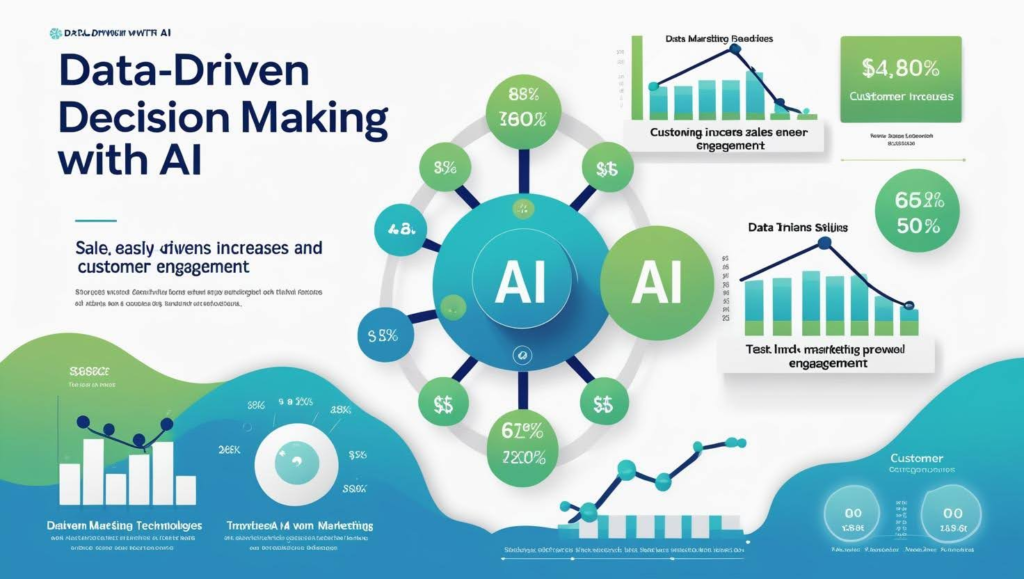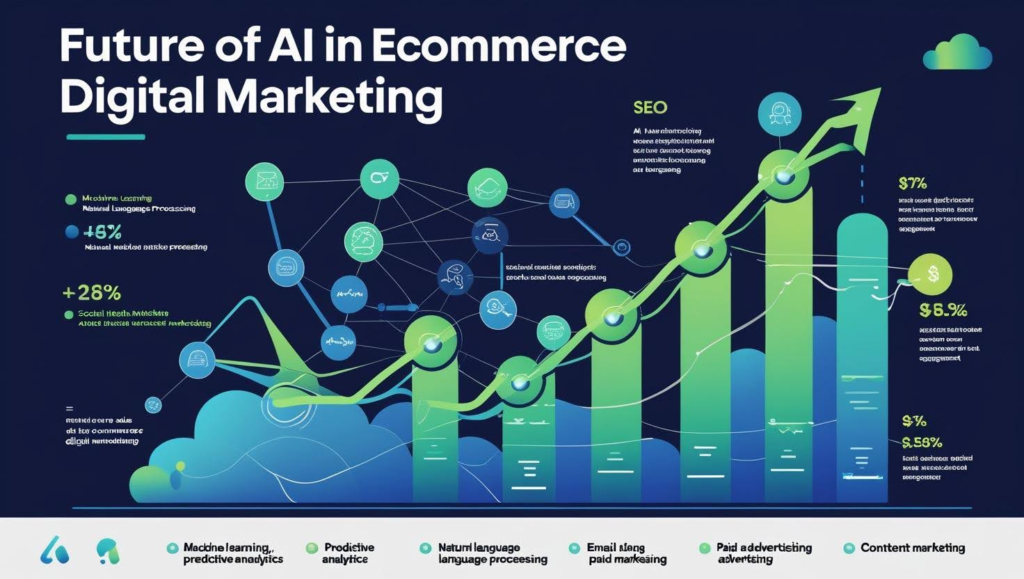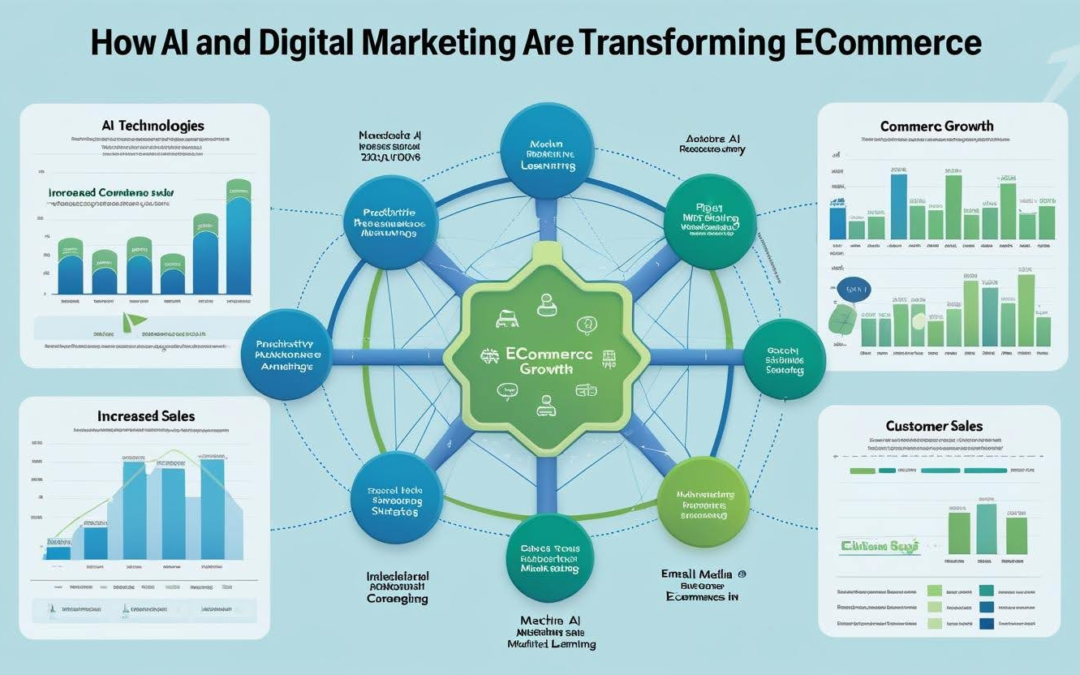Think back a few years ago. Online shopping was mostly about scrolling through product catalogs, adding items to a cart, and waiting for delivery. Fast forward to today, and it feels like every click, swipe, or search is tailored just for you. That’s not magic—it’s artificial intelligence (AI) and digital marketing working together to reshape the eCommerce industry.
AI is no longer just a buzzword reserved for tech conferences or sci-fi movies. It’s powering the recommendations you see on Amazon, the ads that follow you across platforms, and the chatbot that answers your midnight queries. For eCommerce, AI is becoming the engine that drives smarter marketing, hyper-personalized shopping experiences, and faster business decisions.
Before we dive deep, let’s outline the key takeaways you’ll walk away with from this article.
Key Takeaways
- AI is redefining digital marketing in eCommerce by enhancing personalization, customer experience, and predictive analytics.
- Tools like chatbots, recommendation engines, and programmatic advertising are no longer optional—they’re essential for staying competitive.
- Real-world examples from Amazon, Alibaba, and Shopify showcase the tangible benefits of AI in driving sales and customer loyalty.
- While the opportunities are massive, challenges like data privacy and ethical AI usage can’t be ignored.
- The future of AI in eCommerce points toward hyper-personalization, voice commerce, AR/VR shopping, and blockchain integrations.
Understanding the Core: AI, Digital Marketing & eCommerce
At its heart, AI in digital marketing for eCommerce is about using machines to process data, recognize patterns, and make decisions—often faster and more accurately than humans.
Digital marketing, traditionally driven by human creativity and strategy, is now heavily data-driven. From Google Ads optimization to email automation, AI acts as the invisible hand shaping campaigns and consumer experiences.
For eCommerce businesses, this means better targeting, smarter pricing strategies, and an ability to understand customer behavior at an unprecedented scale. Imagine not just knowing what your customer bought, but predicting what they’ll want next week. That’s the power of AI-fueled marketing.
Key Areas Where AI Is Transforming eCommerce Digital Marketing
Let’s unpack the major areas where AI is leaving its mark in eCommerce.
1. Personalization at Scale
We’ve all experienced it—the uncanny accuracy of product recommendations on Amazon or Netflix. This is AI-powered personalization at work. By analyzing browsing history, purchase patterns, and even time spent on certain product pages, AI crafts a shopping experience tailored uniquely to each customer. For businesses, this translates into higher conversion rates and stronger customer loyalty.
2. Customer Experience & Engagement
AI isn’t just about selling—it’s about serving. Chatbots and virtual assistants provide 24/7 customer support, handle queries in multiple languages, and can even analyze customer sentiment. The result? A smoother, more engaging buying journey where the customer feels heard and supported.
3. Content Creation & Optimization
Creating hundreds of product descriptions or ad copies can be overwhelming. Enter AI-driven content creation tools that generate optimized copy at scale. Pair that with machine learning algorithms that continuously test headlines, pricing, and visuals, and you get marketing campaigns that refine themselves over time.
4. Search & Discovery
Traditional keyword search is evolving. AI-powered search engines now support visual search (upload a picture to find a similar product) and voice search (asking Alexa or Siri to shop for you). For eCommerce brands, optimizing for AI-driven SEO is becoming just as important as traditional search.
5. Advertising & Campaign Optimization
Gone are the days of manual ad placements. Programmatic advertising, fueled by AI, automates real-time bidding, ensures ads reach the right audience at the right time, and continuously adjusts based on performance. Marketers save time and maximize ROI without guesswork.
Data-Driven Decision Making with AI

Data is often called the “new oil,” and in eCommerce, AI is the refinery. Instead of drowning in spreadsheets, businesses now use AI-driven predictive analytics to make informed decisions.
From demand forecasting (predicting how much stock you’ll need next season) to inventory management (knowing which products to restock), AI minimizes waste and boosts efficiency. Predictive analytics also helps reduce churn by identifying when a customer is likely to disengage—allowing businesses to re-engage them proactively.
The result? Smarter decision-making and a business strategy that’s always one step ahead of consumer behavior.
AI Tools & Technologies Reshaping eCommerce Marketing
The adoption of AI in digital marketing is not theoretical—it’s already happening through powerful tools and technologies that eCommerce businesses of all sizes are using daily. From content creation to advertising optimization, these tools are reshaping how online retailers engage customers, manage operations, and drive sales.
1. AI-Powered Content & Copywriting Tools
Creating product descriptions, ad copy, and SEO-optimized blogs can take hours. Tools like ChatGPT, Jasper AI, and Copy.ai are changing the game by generating human-like content at scale. For eCommerce, this means you can instantly create hundreds of unique, keyword-rich product listings while maintaining a consistent brand voice. This not only saves time but also improves search engine rankings and conversion rates.
2. AI-Driven Advertising & Campaign Management
Platforms like Google Ads Smart Bidding and Meta Ads AI (Facebook & Instagram) use machine learning to optimize ad targeting and bidding strategies in real-time. Instead of manually testing every campaign variable, AI identifies the best-performing audience segments, creatives, and placements. Programmatic advertising platforms, such as The Trade Desk, also leverage AI to automate ad buying, ensuring businesses reach the right person at the right time—maximizing ROI.
3. Customer Support & Chatbots
AI-powered chatbots like Drift, Intercom, and ManyChat deliver 24/7 customer service. They can answer FAQs, recommend products, and guide customers through checkout. Some advanced bots even use sentiment analysis to detect customer frustration and escalate to a human representative when needed. For small eCommerce stores, this means offering enterprise-level support without the high staffing costs.
4. Recommendation Engines & Personalization Platforms
Personalization is at the heart of modern eCommerce. Tools like Dynamic Yield, Nosto, and Clerk.io analyze customer behavior and deliver tailored product recommendations in real-time. Whether it’s upselling accessories, suggesting similar products, or personalizing homepage banners, these AI systems can dramatically increase average order value (AOV) and customer retention.
5. Search & Visual Discovery Tools
Traditional search bars are giving way to AI-powered search engines. Solutions like Algolia, Klevu, and Syte enable advanced features like natural language processing (NLP) for voice queries and visual search where users upload a picture to find matching products. With voice shopping expected to hit $80 billion by 2025, optimizing for AI-driven search is quickly becoming essential.
6. Predictive Analytics & CRM Integration
AI-driven analytics platforms such as Salesforce Einstein, Zoho Analytics, and Klaviyo AI help businesses predict customer behavior, segment audiences, and forecast demand. For example, a predictive analytics tool can identify which customers are most likely to churn and trigger personalized email campaigns to re-engage them. These insights transform raw data into actionable marketing strategies.
7. AI in AR/VR Shopping Experiences
Tools like Shopify AR, Wanna Kicks, and IKEA Place use AI combined with augmented reality (AR) and virtual reality (VR) to create immersive shopping experiences. Customers can “try on” sneakers, see how furniture fits in their living space, or test makeup shades virtually. This not only reduces return rates but also boosts buyer confidence.
8. Fraud Detection & Security
With the rise of online shopping comes the risk of fraud. AI tools like Kount, Riskified, and Sift use machine learning to detect suspicious behavior, protect payment gateways, and reduce chargebacks. This ensures customer trust and brand reputation remain intact.
9. Inventory & Supply Chain Optimization
AI systems such as Llamasoft and Blue Yonder are helping eCommerce companies predict demand, automate restocking, and optimize delivery routes. By reducing overstocking and stockouts, these tools cut costs while ensuring customer satisfaction.
Why These Tools Matter
The real power of AI tools lies in accessibility. Ten years ago, only tech giants like Amazon or Alibaba had access to such advanced technology. Today, thanks to SaaS platforms and plug-and-play integrations, even small Shopify or WooCommerce store owners can adopt AI tools at a fraction of the cost.
By integrating these technologies, businesses gain:
- Efficiency (automating time-consuming tasks)
- Accuracy (data-driven decisions)
- Scalability (growth without proportional cost increases)
- Customer Satisfaction (personalized experiences that build loyalty)
AI tools aren’t just add-ons—they’re becoming the backbone of modern eCommerce marketing.
Case Studies & Real-World Applications
When it comes to AI in eCommerce, the theory sounds impressive—but the real magic lies in how companies are applying it at scale. Let’s break down some real-world examples that demonstrate AI’s transformative power.
Amazon: The Benchmark of AI in Retail
Amazon’s dominance in global eCommerce is heavily fueled by its AI-driven recommendation engine. Research suggests that 35% of Amazon’s revenue comes directly from product recommendations. The system analyzes browsing history, previous purchases, and even what similar customers have bought. The more you shop, the smarter it gets. On top of that, Amazon’s Alexa-powered voice commerce is steadily expanding, allowing customers to order products simply by speaking to a device.
Alibaba: AI Beyond Recommendations
Alibaba, the Chinese eCommerce giant, takes AI a step further. Their AI algorithms don’t just recommend products—they optimize logistics, supply chains, and fraud detection. During Singles’ Day (the world’s largest shopping event), Alibaba processes hundreds of millions of orders in real time, and it’s AI that ensures products are priced competitively, warehouses are stocked, and deliveries run smoothly.
eBay & Visual Search
eBay has adopted visual search technology. Shoppers can upload an image, and AI finds similar items across millions of listings. This caters to modern buyers who don’t always know the right keywords but can recognize what they want visually.
Shopify & Small Business AI Adoption
What about small businesses? Platforms like Shopify are democratizing AI, giving smaller retailers access to tools once only affordable for giants. Shopify’s AI features include automated product tagging, chatbots, and predictive analytics. A small D2C fashion brand, for example, can now compete with major retailers by offering personalized product recommendations or AI-driven abandoned cart recovery emails.
The lesson here is simple: AI isn’t just for global powerhouses. Whether you’re a startup or a Fortune 500 company, AI can drive measurable results in sales, efficiency, and customer loyalty.
Challenges & Ethical Considerations
While the benefits of AI in eCommerce digital marketing are immense, there are also serious challenges and ethical concerns that businesses cannot afford to overlook.
1. Data Privacy and Consumer Trust
Consumers are more aware than ever of how their personal data is being used. Regulations like GDPR in Europe and CCPA in California demand that companies be transparent about data collection and usage. Customers want personalized experiences, but they don’t want to feel like they’re being spied on. Striking the balance between personalization and privacy will determine whether brands gain or lose consumer trust.
2. Algorithmic Bias
AI is only as unbiased as the data it learns from. If an algorithm is trained on incomplete or biased data, the results can unintentionally discriminate. For example, an AI ad targeting system could exclude certain demographics or prioritize one audience group over another. This raises concerns about fairness, inclusivity, and accountability.
3. The “Black Box” Problem
Many AI algorithms operate like a “black box,” making decisions that even developers struggle to fully explain. This lack of transparency can create issues when businesses need to justify how and why certain recommendations or ad placements are made. For highly regulated industries, this is particularly problematic.
4. Over-Automation and Loss of Human Touch
While automation saves time and resources, an over-reliance on AI risks making customer experiences feel robotic. Imagine a scenario where every touchpoint—from browsing to checkout to customer service—is AI-driven. It’s efficient but may lack the human empathy and emotional intelligence that consumers still crave.
5. Security Risks
AI systems, just like any other technology, can be vulnerable to cyberattacks. Hackers could manipulate AI-driven pricing systems, recommendation engines, or even ad targeting algorithms. This poses a risk not just to businesses but also to consumers’ financial safety.
In short, the adoption of AI in eCommerce marketing comes with a responsibility: businesses must ensure transparency, fairness, and security if they want long-term success.
Future of AI in eCommerce Digital Marketing

If today feels exciting, the future of AI in eCommerce looks revolutionary. The trends we’re beginning to see now will soon reshape how customers shop, interact with brands, and make purchasing decisions.
1. Hyper-Personalization
Personalization today is based on browsing history and purchases. But the next wave of AI will take it further—analyzing real-time data like mood, device usage, and even biometric signals. Imagine logging into an online store and seeing not just personalized recommendations, but a homepage that rearranges itself entirely based on your preferences, shopping habits, and current needs.
2. Voice Commerce Explosion
Voice commerce is projected to reach $80 billion globally by 2025. Smart assistants like Alexa, Google Assistant, and Siri will become everyday shopping companions. For brands, this means optimizing not just for text-based SEO, but for voice search queries that sound more conversational.
3. AR/VR-Powered Shopping Experiences
Artificial intelligence combined with augmented reality (AR) and virtual reality (VR) will bring “try before you buy” shopping into the mainstream. Customers can visualize how furniture fits in their living room using AR, or try on clothes virtually through VR before making a purchase. Brands like IKEA and Sephora are already experimenting with these innovations.
4. AI-Blockchain Integration
The next frontier could be the union of AI and blockchain technology. AI could personalize product recommendations, while blockchain ensures that supply chains remain transparent and secure. This combination could help solve issues like counterfeit products and fraud in online marketplaces.
5. Sustainability and Ethical AI
As consumers become more environmentally conscious, AI will also play a role in optimizing sustainable eCommerce. Machine learning can minimize overproduction, optimize delivery routes to cut carbon emissions, and even help brands predict which eco-friendly products customers are most likely to purchase.
6. The Rise of Autonomous Commerce
Picture this: an AI system that monitors your household, notices you’re running out of detergent, and automatically orders it for you. This concept, known as autonomous commerce, is expected to grow in the next decade. It shifts shopping from being an active decision to a seamless, invisible process.
The future isn’t just about more advanced tools—it’s about reshaping the entire customer journey. Brands that prepare for these trends today will not only survive but thrive in the AI-powered eCommerce revolution.
Actionable Takeaways for Marketers & Businesses
So, how do you start leveraging AI without being overwhelmed?
- Begin small: integrate an AI chatbot or use AI-driven analytics for campaign optimization.
- Upskill: marketers need to embrace skills like data analysis and AI tool management.
- Think long-term: AI is not just a trend but the future backbone of eCommerce marketing.
The earlier businesses adopt AI, the stronger their competitive edge.
Conclusion
The fusion of AI, digital marketing, and eCommerce isn’t just transforming how we shop—it’s reshaping the entire digital economy. From personalized shopping experiences to predictive decision-making, AI empowers businesses to anticipate, engage, and delight customers in ways we couldn’t have imagined a decade ago.
Yes, challenges exist—data privacy, bias, and ethical concerns—but the opportunities far outweigh the risks. The future of eCommerce belongs to those who embrace AI not just as a tool, but as a strategic partner in growth.
So, whether you’re a startup owner, a seasoned marketer, or just someone curious about the future of shopping—remember this: AI isn’t coming to eCommerce. It’s already here. And it’s only getting smarter.

